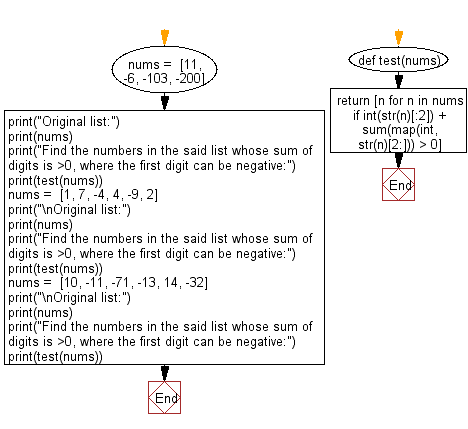Python: Filter for the numbers in a list whose sum of digits is >0, where the first digit can be negative
Filter by Sum of Digits
Write a Python program to filter for numbers in a given list whose sum of digits is > 0, where the first digit can be negative.
Input: [11, -6, -103, -200] Output: [11, -103] Input: [1, 7, -4, 4, -9, 2] Output: [1, 7, 4, 2] Input: [10, -11, -71, -13, 14, -32] Output: [10, -13, 14]
Sample Solution:
Python Code:
# Define a function named 'test' that takes a list of numbers 'nums' as input
def test(nums):
# Use a list comprehension to filter numbers based on the sum of their digits
return [n for n in nums if int(str(n)[:2]) + sum(map(int, str(n)[2:])) > 0]
# Assign a specific list of numbers to the variable 'nums'
nums = [11, -6, -103, -200]
# Print a message indicating the original list of numbers
print("Original list:")
# Print the original list of numbers
print(nums)
# Print a message indicating the numbers whose sum of digits is >0, allowing negative first digits
print("Find the numbers in the said list whose sum of digits is >0, where the first digit can be negative:")
# Print the result of the test function applied to 'nums'
print(test(nums))
# Assign another specific list of numbers to the variable 'nums'
nums = [1, 7, -4, 4, -9, 2]
# Print a message indicating the original list of numbers
print("\nOriginal list:")
# Print the original list of numbers
print(nums)
# Print a message indicating the numbers whose sum of digits is >0, allowing negative first digits
print("Find the numbers in the said list whose sum of digits is >0, where the first digit can be negative:")
# Print the result of the test function applied to 'nums'
print(test(nums))
# Assign another specific list of numbers to the variable 'nums'
nums = [10, -11, -71, -13, 14, -32]
# Print a message indicating the original list of numbers
print("\nOriginal list:")
# Print the original list of numbers
print(nums)
# Print a message indicating the numbers whose sum of digits is >0, allowing negative first digits
print("Find the numbers in the said list whose sum of digits is >0, where the first digit can be negative:")
# Print the result of the test function applied to 'nums'
print(test(nums))
Sample Output:
Original list: [11, -6, -103, -200] Find the numbers in the said list whose sum of digits is >0, where the first digit can be negative: [11, -103] Original list: [1, 7, -4, 4, -9, 2] Find the numbers in the said list whose sum of digits is >0, where the first digit can be negative: [1, 7, 4, 2] Original list: [10, -11, -71, -13, 14, -32] Find the numbers in the said list whose sum of digits is >0, where the first digit can be negative: [10, -13, 14]
Flowchart:

For more Practice: Solve these Related Problems:
- Write a Python program to filter a list of integers and return those whose sum of digits is greater than 0, handling negative first digits.
- Write a Python program to compute the digit sum for each number and select only those with a positive digit sum.
- Write a Python program to iterate over a list and include numbers with non-zero digit sums in the output list.
- Write a Python program to use lambda functions to filter numbers by verifying that the sum of their digits exceeds zero.
Go to:
Previous: Find the minimum even value and its index from a given array of numbers.
Next: Find the indices of two entries that show that the list is not in increasing order.
Python Code Editor :
Have another way to solve this solution? Contribute your code (and comments) through Disqus.
What is the difficulty level of this exercise?
Test your Programming skills with w3resource's quiz.
